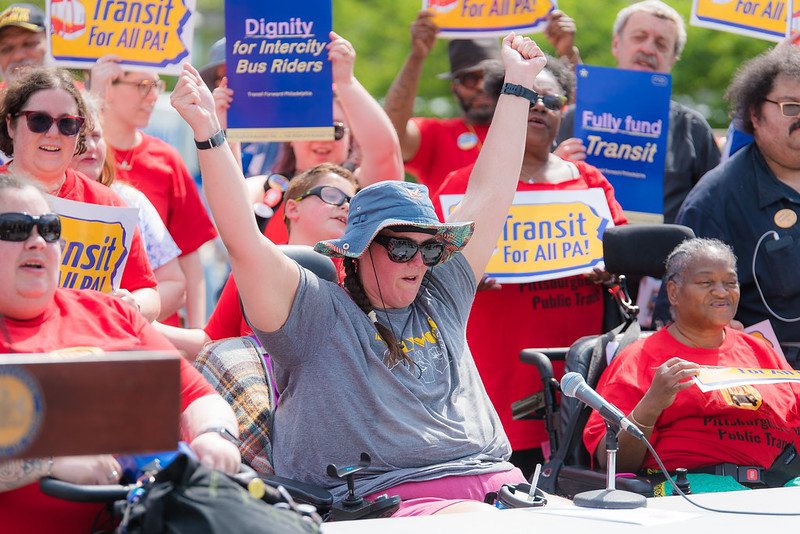
PRT’s New Stroller policy should include public input from the disabled community. Join us at the PRT board meeting to advocate for policy that makes transit accessible for all.
We strive for access for all in our transit system. We know that if we work together as a community with PRT that we can make policies that positively impact and prioritize the needs of all riders. This is why we think the new stroller policy can be adapted to do just that.
The stroller policy on PRT is inhabiting the ability for disabled riders to get on the bus, or be safe while on the bus. With no guidance on how strollers should be stored while open for safety, and no policy on how to navigate using mobility device spaces on the buses for strollers, it is difficult for riders and operators to navigate situations where open strollers are inhabiting spaces where people using mobility devices need to be to ride the buses, and be secured to ensure their safety while on buses.
There are two spaces for mobility devices on buses that carry from 40 to 60 passengers. We have heard from disabled riders that they are often passed up on buses because there is no space for them. It is already likely that these spaces are used. Allowing open strollers on buses crowds these spaces even faster, making it difficult for disabled riders to even be let onto buses to get to where they need to go throughout their day.
We are at a critical point for making our transit more accessible for everyone in Allegheny County. The PPT accessibility committee and other members of our organization have created a letter to the PRT board about the policy changes. Accessibility Committee advocates will read at the leader and give testimony upcoming meeting on Friday, May 24th, 2024, where we will ask for changes that could positively impact the disabled ridership in Allegheny County.
Join PPT’s Accessibility Committee:
Read a copy of the PPT Accessibility Committee’s statement on the new stroller policy:
PPT Statement on New Stroller Policy
In the second half of 2023, PRT adopted a new stroller policy allowing open strollers on buses. Unlike other large transit agencies such as MTA and SEPTA who have recently revised their stroller policies, PRT did not obtain community feedback prior to this change and did not issue the new policy in conjunction with changes to bus designs to accommodate strollers outside of the accessible seating area. As a result, the change was made suddenly and without the engagement that would have alerted PRT to issues now being seen throughout the bus system.
Since the new policy was announced, people who use wheelchairs and scooters have been denied access to buses as a result of open strollers parked in the accessible seating area. Drivers have passed them at bus stops when open strollers are already present in the accessible seating area, and riders with strollers have refused to move from accessible seats when requested by drivers. People with disabilities are already negatively impacted by PRT’s infrequent service and now must contend with additional lack of access to buses despite their rights under the Americans with Disabilities Act (“ADA”).
Further, the new stroller policy has not been implemented safely for children in strollers as well as other passengers. Open strollers are not consistently secured to prevent rolling while the bus is moving. Children are not always appropriately strapped into the stroller. People with disabilities attempting to use accessible seating often have difficulty maneuvering around a stroller in order to sit or safely park their wheelchair or scooter.
Pittsburghers for Public Transit, along with the undersigned organizations and community members, is deeply concerned about the development and implementation of this new policy. PRT failed to consult with people with disabilities, including the Committee for Accessible Transportation and the City-County Task Force on Disabilities, before making this change. The new policy has resulted in increased barriers for people who use wheelchairs and scooters, and we are troubled by implementation that appears to not comply with the ADA. It has also not been applied in a way that keeps riders, especially young children, safe. We are concerned that the failure to ensure both strollers and children are secure will result in harm to some of PRT’s most vulnerable riders.
In light of the above, PRT must take the following steps:
- Consistently enforce accessible seating priority being given to people with disabilities, as required under the ADA, and seniors.
- Provide training to drivers on the riders prioritized for use of the accessible seating area and how to navigate conflict over these seats.
- Create designated stroller areas on buses that allow for open strollers to safely be stored on the bus in an area separate from accessible seating.
- Require any open stroller to have its brakes engaged and be physically held by the individual controlling it.
- Obtain community input on a final version of the stroller policy that supports parents and children without denying people with disabilities access to the only seating area available for their use on the bus.